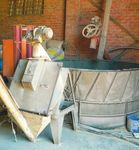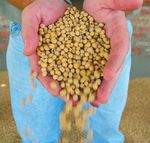25% farmer premium FROM PROCESSED SOYA - business - the Protein Research Foundation
←
→
Page content transcription
If your browser does not render page correctly, please read the page content below
business
25% farmer premium
FROM PROCESSED SOYA
desPite south AfricA’s huge demAnd for soyA oiLcAke, LocAL soyA-Processing fAciLities Are few And fAr between.
A smALL grouP of fArmers And businessPeoPLe Are tAking AdvAntAge of this situAtion – they Process their own
soyA beAn croPs to suPPLy LocAL AnimAL feed mAnufActurers with A homegrown Product. Lloyd Phillips rePorts.
t
HE PROTEIN RESEARCH
Foundation estimates that in 2010
South Africa will need 2,07 million • Processing soya grain into soya oilcake locally is
tons of protein for animal feed. economically viable, and there is a demand for it.
This is projected to increase to around
• In 2006/7, South Africa imported 67% of its
2,8 million tons in 2020. But in 2006/07, soya oilcake, mainly from Argentina.
the country produced only about 36 500t,
• Farmer-partners realise about 25%
and imported 67% of its oilcake protein more from processing their grain, than
needs, of which 808 000t was soya based. by selling it on the open market.
While this import trend continues,
it creates an opportunity for local
entrepreneurs to establish their own soya- beans into these two products, while the
processing facilities. With this in mind, four remaining 65% is processed into full-fat
farmers and two businesspeople from KZN soya, mostly exported to Swaziland.
have established Kunjaneni Protein The soya beans are sourced from part of
Products (KPP), a mechanical soya- the partner farmers’ annual crop, and that
Cleaned soya beans to be milling plant near Normandien. of another local farmer, Frikkie Cronje. It
processed at KPP. This high- Around 85% of KPP’s processes around 900t/month of soya beans
protein crop is used as
human food and in animal input becomes oilcake, and a month, supplying it directly to animal-feed
feed products. South Africa the balance becomes soya manufacturers in northern KZN, Gauteng
is suitable for extensive oil. KPP turns 35% of its soya and Swaziland. “This is economically
soya bean production,
but still imports significant
quantities of soya oilcake, A young soya bean land. Kunjaneni Holdings’ farmer-partners
mainly from Argentina. currently supply most of KPP’s soya bean needs. When the larger
Photos: LLoyd PhiLLiPs Normandien Kunjaneni Grain Products mill opens around the end of 2010,
KWAZULU-NATAL contracted farmers within a 150km radius will supply the rest.
DERICH
EICKER
34 12 February 2010 | farmer’s weeklyKPP produces full-fat soya, shown
here by mill foreman Mduduzi
Kubeka. Most is exported to
Swaziland, where animal feed
manufacturers process it further.
ABOVE: At KPP, unprocessed soya beans
are fed by auger from the delivery
bay into this temporary holding bin
for grinding and heat processing.
BELOW: The two soya-processing mills that
viable,” says Derich Eicker, partner and used to belong to Stephan Geldenhuys
managing director of Kunjaneni Holdings, and Koos Potgieter respectively. Now,
Full-fat soya the mills run side-by-side on a portion
KPP’s holding company. The remaining Produced from cooked soya beans from which of Stephan’s farm near Normandien.
partners are Kunjaneni Holdings’ chief oil has not been extracted, leaving a 36%
financial officer, Alan Fletcher, and farmers protein content and 18% oil content.
Stephan Geldenhuys, Koos Potgieter,
Nkosi Douglas Zondo and Christo Clack.
Soya oil
Soya oil, whether liquid or partially hydrogenated,
is sold as ready-to-use vegetable oil or
Crunching the numbers used in a variety of processed foods.
“The farmer-partners get a calculated
25% more income from their soya Soya oilcake
The solid residue remaining after the oil has
bean crops as processed product, been pressed from soya beans. It is ground
than as unprocessed soya bean on and used as a component in animal feed.
the open market,” Derich explains.
But to sustain this profitability, KPP needs
the maximum throughput. The farmer- imported from Argentina. If that supply
partners supply about 70% of KPP’s soya faltered, it would affect South African feed
beans, and store their crops on the farm for manufacturers’ production, and increase
delivery to the mill throughout the year. local soya bean and soya oilcake prices.
KPP sources the remaining 30% from Afgri. There’s also the cost of importing soya
“There is a definite market for KPP’s products. Imported 47% protein soya oilcake
processed soya,” says Derich. Local feed
manufacturers depend mainly on oilcake Continued on next page
A brief history of Kunjaneni Protein Products
Kunjaneni Holdings’
Just before the 2005/06 summer grain small on-farm mechanical soya-processing mission statement
production season, Stephan Geldenhuys mill with an annual capacity of 3 500t of
and Koos Potgieter met to discuss the soya beans. Evaluating the performance • To develop emerging farmers into
economic viability of extensive soya and profitability of these mills and successful commercial farmers.
production. They concluded that their their products, they were sufficiently • To exceed all stakeholders’ expectations
soya production enterprises urgently impressed to join forces to establish the and to provide satisfactory returns.
needed a value-adding aspect. larger KPP mill on a portion of Stephan’s • To comply with all legislation
As a net importer of processed soya farm Farm Acres, near Normandien. and regulations applicable to all
products, South Africa had a niche for Other partners have since joined areas of the soya value chain.
local entrepreneurs to expand on its the enterprise, and plans are now • To make a meaningful contribution to
relatively small soya processing sector. underway to establish a 40 000t/year the preservation of the environment.
So Stephan and Koos each invested in a chemical soya-processing plant.
farmer’s weekly | 12 February 2010 35business
lands in Durban harbour at a Enriching farmers “These farmers would benefit from the
similar price to the locally produced product, Collectively, the two mills will need about supply agreement, as they’d have a
but transporting it increases the costs. 55 500t of soya bean annually. As the guaranteed buyer for their soya beans,
It currently costs R260/t to transport farmer-partners currently produce around and we’d have a guaranteed supply.”
soya oilcake from Durban harbour to 22 500t every summer, the 33 000t shortfall
Randfontein in Gauteng. “Transporting KPP’s will be sourced from other producers Expanding into biofuel
products from Normandien to Randfontein within a 150km radius of the two mills. The long-term plan for Kunjaneni Grain
currently costs around R100/t – a major cost Products includes producing soya-based
saving for our clients,” explains Derich. biodiesel on a commercial scale. Derich
‘Kunjaneni Holdings will
says that the production equipment would
Next: chemical processing recruit contract farmers be an add-on to the chemical processing
“Unfortunately, our mill’s mechanical to grow and supply plant, diverting some of the soya oil
process can produce only 41% to 43% soya beans to the mills.’ from the mill to biodiesel production.
protein oilcake. South Africa’s major feed Potential production is around 7 million
manufacturers don’t want mechanically litres annually, much of it to be used by
processed soya oilcake, so we market Transport from further away the farmer-partners’ crop-management
it to smaller feed manufacturers, or would be unprofitable. contracting companies. Excess biodiesel
to farmers who mix feed on-farm. “Kunjaneni Holdings will recruit contract could be made available to the contract
But we plan to change this.” farmers – who’ll probably include land soya growers, and other users in the area.
Kunjaneni Holdings will set up a chemical reform beneficiaries – to grow and supply “We’ll start producing biodiesel when the
soya processing plant to process 200t/day soya beans to the mills,” explains Derich. government comes up with a sound biofuel
of soya beans into 47% protein oilcake. This “The farmer-partners have two crop- policy,” says Derich. “This will be a major
mill, to be situated in Northern KZN, will management contracting services between boost for the green and environmentally
be called Kunjaneni Grain Products. KPP them. Working extensively with land reform friendly profile of our operations.”
will continue operating in Normandien, beneficiaries, they have established many • Contact Derich Eicker at 082 774 0419,
and produce only full-fat soya. strong business and trust relationships. or fceicker@gmail.com |fw
Did you know?
You can search for previous
Farmer’s Weekly articles
on our website.
You can also find the latest
bakkie and tractor prices,
daily weather reports and
the latest commodity prices.
Go check it out!
www. farmersweekly.co.za
36 12 February 2010 | farmer’s weeklyYou can also read























































